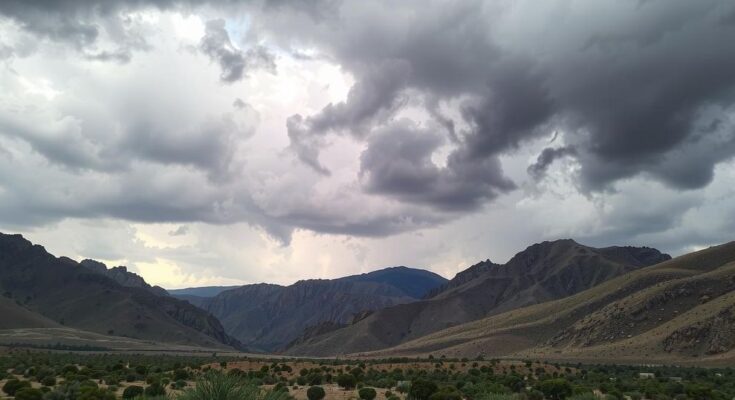Ethiopia faces a profound crisis marked by ethnic tensions, economic difficulties, and political instability. Following the civil conflict in Tigray and the flawed peace agreement, ethnic divisions remain pronounced. Abiy Ahmed’s strategies to consolidate power risk renewed conflict, particularly among the Amhara and Oromo. The dire economic situation, compounded by inflation and unemployment, drives many toward armed groups. The Prime Minister’s aggressive foreign policy, particularly relating to access to the sea, complicates regional stability. Unless addressed, Ethiopia risks escalating into a regional crisis, necessitating urgent international intervention.
Ethiopia is currently engaging in a significant political and societal crisis characterized by ethnic divisions, economic turmoil, and rising instability. The civil war in the Tigray region from 2020 to 2022 has left the nation exhausted and uncertain. While the Pretoria peace agreement has brought temporary respite, it has not mended the deep-seated conflicts between the federal government and the Tigray People’s Liberation Front (TPLF). Internal divisions within the TPLF pose an additional challenge, as some factions are open to cooperation with Prime Minister Abiy Ahmed, while others reject his government entirely.
Prime Minister Abiy Ahmed faces increasing dissent among the Amhara, Ethiopia’s second-largest ethnic group. These militias played a vital role in fighting TPLF forces during the Tigray conflict and anticipated recognition of their contributions post-war. However, following the peace agreement, many Amhara residents felt betrayed, given the government’s decisions to disarm some militias and unresolved territorial disputes, particularly regarding Wolkait and Raya. A new resistance movement in Amhara continues to generate unrest, prompting the government to declare a state of emergency.
Moreover, Abiy Ahmed is experiencing rising dissent in his home region of Oromia, which is Ethiopia’s largest and predominantly Oromo region. Despite initial optimism surrounding his appointment as the first Oromo Prime Minister, many Oromo citizens feel disillusioned. The Oromo Liberation Army (OLA) has waged a guerrilla war against his government, accusing him of centralizing authority and neglecting their interests. This conflict is straining Abiy’s political support, and rural communities face severe humanitarian conditions amid ongoing violence.
Ethiopia is grappling with a dire economic crisis characterized by high inflation, rising unemployment, and the dire consequences of past militarized conflicts. Prices for essential foodstuffs such as teff and wheat have surged, pushing many families into deeper poverty and leading youth to seek opportunities with armed groups or abroad. The government is burdened with substantial debt to international creditors, necessitating difficult economic reforms to stave off financial disaster.
Given the interconnected crises of ethnic conflict, political instability, and economic downturn, Ethiopia is teetering on the edge of potential failure. Analysts are warning that the nation could devolve into a “failed state,” particularly as Abiy’s policies have failed to meet citizens’ hopes for peace and stability. Formerly viewed as a beacon of hope, Abiy is now seen as increasingly authoritarian, seeking to distract from domestic issues through aggressive foreign policy initiatives, such as his demand for access to the sea.
Ethiopia’s landlocked status since Eritrea’s independence in 1993 is not a new grievance, as historical leaders have invoked similar claims to justify expansionist policies. Abiy Ahmed has leveraged the notion of Ethiopia’s historical coastal status for political gain, yet he faces significant diplomatic hurdles given that such access would depend on the cooperation of neighboring nations.
The memorandum of understanding signed with Somaliland on January 1, 2024, granting Ethiopia access to the Red Sea, has incited significant backlash, particularly from Somalia, which maintains that Somaliland is part of its territory. Somalia has signaled that it may respond with countermeasures, further straining regional stability. Additionally, tensions between Ethiopia and Eritrea are resurging, with significant troop movements observed near their border, signaling a potential new conflict.
Heightened military conflict between Ethiopia and Eritrea could have dire regional ramifications, potentially dragging Somalia, Djibouti, and Sudan into violence, especially given the historical animosity and unresolved issues between these nations. The Horn of Africa is already a volatile region, and an outbreak of war would exacerbate humanitarian crises, displacing millions and worsening food insecurity amid existing challenges.
Prime Minister Abiy Ahmed’s ability to navigate these complex geopolitical dynamics through diplomacy remains uncertain. Should he fail to pursue peaceful resolutions, the region risks plunging into a devastating conflict. The international community must take urgent action to mitigate tensions and prevent a new crisis from emerging in the Horn of Africa, which could have far-reaching implications.
Ethiopia is engulfed in a multifaceted crisis characterized by ethnic tensions, political instability, and economic hardship. The fallout from the Tigray conflict continues to deepen divisions within various communities, with Prime Minister Abiy Ahmed facing dissent from multiple ethnic groups, including the Amhara and Oromo. His aggressive foreign policy regarding sea access and the controversial agreement with Somaliland may distract from pressing domestic issues but poses significant geopolitical risks. Without decisive diplomatic efforts, Ethiopia could spiral further into chaos, impacting the entire Horn of Africa. The international community’s intervention is crucial in averting a renewed conflict.
Original Source: moderndiplomacy.eu




